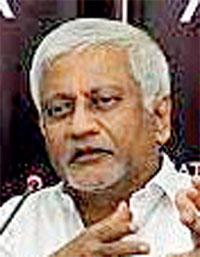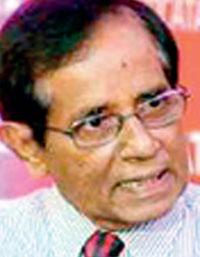13 Dec 2021 - {{hitsCtrl.values.hits}}
By Nishel Fernando
 |
| Rohan Samarajiva |
 |
| Sarath Rajapathirana
|
With the government’s current approach appearing to be failing in its ability to meet upcoming external debt servicing commitments, the Colombo-based policy think tank Advocata Institute urged the government to roll out a broad reform package targeting ‘strategically important’ State-Owned Enterprises (SOEs) as a way to regain confidence of the country’s external creditors, illustrating the determination to resolve the prolonged structural issues in the economy.
According to data presented by Advocata, the cumulative losses incurred by key SOEs were estimated at Rs.1.2 trillion during 2006-2020, while the total SOE debt reached to 9 percent of GDP in 2020. The top five SOEs alone incurred an estimated Rs.384.48 million loss per day burdening both State coffers and ultimately the taxpayer.
“Sri Lanka lacks credibility in its approach to the creditor. In the current context, it’s not possible for us to increase revenue. Therefore, what we have to focus is on cutting expenses. This will send a strong message of responsibility and of commitment to anyone who has given us loans and they will say, ‘this is the country we should negotiate with, because they are serious about their economic problems’,” LIRNEasia Founding Chair and Advocata Institute Advisor Prof. Rohan Samarajiva said.
He was speaking at a press briefing organised by Advocata Institute titled ‘The Urgency of State Owned Enterprise Reforms’ in Colombo last Thursday.
He pointed out that some of the largest SOEs, which run on broken systems, not only burden the State coffers, but also have been failing their product and service delivery to customers. Hence, he opined that the government must prioritise reforming these SOEs instead of merely limiting itself to disposing certain underutilised State assets such as real-estate and hotel properties.
“I am not advocating against disposing such assets. But, that shouldn’t be the focus,” he stressed. In particular, he reiterated his stance on privatisation of SriLankan Airlines, which incurred a record loss of Rs.47 billion in 2020, while emphasising that the privatisation of the national carrier would become a grand gesture in illustrating the country’s genuine commitment to meeting its upcoming debt servicing obligations.
He also argued that it is not pragmatic for the government to own and manage an airline, given constant political interferences taking place in the operations of the airline, in an industry which is globally competitive.
Meanwhile, Advocata Institute Academic Chair Dr. Sarath Rajapatirana blamed the SOEs, which maintain monopolies in certain sectors for poor productivity, while noting that the country’s total factor productivity has been hovering below one percent for several years.
Citing a research conducted by the Asian Development Bank (ADB) Advocata Institute Policy Analyst K.D.D.B. Vimanga noted that Sri Lanka had the lowest cross country comparison of labour productivity of SOEs among South East Asian and Central Asian countries.
Dr. Rajapatirana stressed that SOE reforms are critical to achieve sustainable economic growth by making productivity gains.
Commenting on possible reforms in making SOEs more accountable, the Lankan Angel Network Director and Advocata Institute Adviser Anarkali Moonesinghe highlighted that some SOEs and their units could be listed on the Colombo Stock Exchange (CSE) creating a win-win situation while there are several different other models available.
“This could fundamentally change the stock market similar to South East Asian countries. For this, a strong regulator is very important, good framework and competition is critical. These need to be looked as potential solutions to the current crisis,” she stressed.
Adding on, Prof. Samarajiva cited the country’s telecom sector reforms, including the listing of Sri Lanka Telecom (SLT) on the CSE as a good example of successful SOE reforms and the formation of Telecommunications Regulatory Commission (TRCSL).
He recalled that prior to the opening of telecom sector to competition via privatisation of SLT, there was a 10-year waiting list to obtain a connection. However, following the privatisation and opening up of the sector, SLT started knocking on doors to offer connections to prospective customers due to competition.
Further, he noted that once TRCSL was setup, it had been generating a steady stream of revenue to the government in billions of rupees per annum through spectrum fees and licence fees. Commenting on potential reforms for SOEs such as Ceylon Electricity Board (CEB), Prof. Samarajiva backed reforms focusing on restructuring these entities in order to bring in financial discipline and accountability while noting he doesn’t necessarily support the privatisation of CEB’s grid system.
According to Advocata Institute, there are 527 SOEs in the country and 55 of them are classified as SOEs of strategic importance by the Treasury.
However, the think tank questioned the basis of classification of SOEs such as Cashew Corporation as a strategically important SOE.
It also highlighted the difficulties in obtaining operational performance data of these SOEs with only financial information of 10.4 percent of SOEs being made publicly available.
16 Nov 2024 4 hours ago
16 Nov 2024 4 hours ago
16 Nov 2024 5 hours ago
16 Nov 2024 5 hours ago
16 Nov 2024 7 hours ago